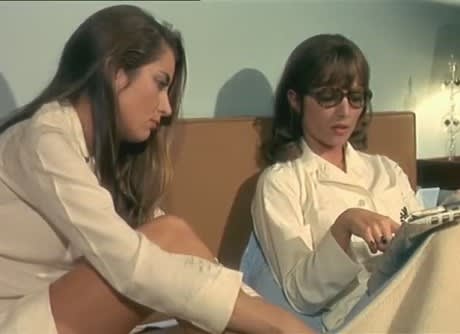In its time, Claude Chabrol's slow-building psychological thriller, Les Biches, was considered taboo. Barbarella had come out a year prior, giving some context for (objectified) female sexuality, but the prospect of lesbians—seen leering at each other's bodies and undoing each other's pants, no less—wasn't conveyed quite so vividly in populist cinema.
As such, this very European take on the Hitchcockian thriller—Chabrol, credited with having started the "nouvelle vague" movement, was influenced by Hitchcock, only using a low budget contemporary approach rather than overt stylization—was sought out by a larger than average mainstream audience keen on partaking in the controversy.
But Chabrol, being a critic for the Cahiers du Cinema and member of the New Wave movement—albeit a far more accessible, less dialectically motivated and image-preoccupied, member—was more interested in exploring the internal mindset on film than providing sensationalist titillation for the masses.
Starting with a loose style, giving the viewer freedom to look at and perceive the narrative from a perspective of their choosing, Les Biches opens with Frédérique (Stephane Audron) picking up a street artist named Why (Jacqueline Sassard) and seducing her with riches and creature comforts. Initially, Frédérique objectifies the assertive and willful younger woman with a coy, subservient disposition, which takes a turn when they travel to St. Tropez and Why becomes the passive feminine counterpart in front of Frédérique's gay friends and a successful architect named Paul Thomas (Jean-Louis Trintignant).
Where Chabrol starts to impose a stylized auteur eye is when Why acknowledges a romantic interest in Paul, leading Frédérique to steal him for herself in an effort to obtain psychological power over her human acquisition.
Beyond the protracted scenes of conversation and subtle scenes of character interplay—the women always force deceptive politeness, manipulating Paul without him being aware—something noteworthy about Chabrol's cleverly plotted and deliberately paced thriller is how naturalistic it was. At the time, the melodramatic, stage-acting style was still employed by most films and genre pieces, while the style of Les Biches was quite subdued and forward thinking.
In fact, ignoring the implicit sexism of the basic plot—two women fighting over a man—there's a lot about this 1968 psychological deconstruction that holds up as a contemporary film even to this day. The languid style and comfort indulging in extended conversations is still more of a European convention, must like the impetus of internal conflict, but the candid human observations and low key style is, up to now, timeless.
Les Biches screens at the TIFF Bell Lightbox as part of the Man and a Woman: Jean-Louis Trintignant and Emmanuelle Riva retrospective at 6:30pm on February 7th, 2013.
(CFDC)As such, this very European take on the Hitchcockian thriller—Chabrol, credited with having started the "nouvelle vague" movement, was influenced by Hitchcock, only using a low budget contemporary approach rather than overt stylization—was sought out by a larger than average mainstream audience keen on partaking in the controversy.
But Chabrol, being a critic for the Cahiers du Cinema and member of the New Wave movement—albeit a far more accessible, less dialectically motivated and image-preoccupied, member—was more interested in exploring the internal mindset on film than providing sensationalist titillation for the masses.
Starting with a loose style, giving the viewer freedom to look at and perceive the narrative from a perspective of their choosing, Les Biches opens with Frédérique (Stephane Audron) picking up a street artist named Why (Jacqueline Sassard) and seducing her with riches and creature comforts. Initially, Frédérique objectifies the assertive and willful younger woman with a coy, subservient disposition, which takes a turn when they travel to St. Tropez and Why becomes the passive feminine counterpart in front of Frédérique's gay friends and a successful architect named Paul Thomas (Jean-Louis Trintignant).
Where Chabrol starts to impose a stylized auteur eye is when Why acknowledges a romantic interest in Paul, leading Frédérique to steal him for herself in an effort to obtain psychological power over her human acquisition.
Beyond the protracted scenes of conversation and subtle scenes of character interplay—the women always force deceptive politeness, manipulating Paul without him being aware—something noteworthy about Chabrol's cleverly plotted and deliberately paced thriller is how naturalistic it was. At the time, the melodramatic, stage-acting style was still employed by most films and genre pieces, while the style of Les Biches was quite subdued and forward thinking.
In fact, ignoring the implicit sexism of the basic plot—two women fighting over a man—there's a lot about this 1968 psychological deconstruction that holds up as a contemporary film even to this day. The languid style and comfort indulging in extended conversations is still more of a European convention, must like the impetus of internal conflict, but the candid human observations and low key style is, up to now, timeless.
Les Biches screens at the TIFF Bell Lightbox as part of the Man and a Woman: Jean-Louis Trintignant and Emmanuelle Riva retrospective at 6:30pm on February 7th, 2013.
